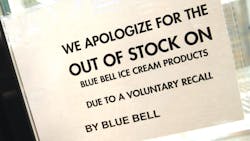In May Blue Bell Creameries announced that it would furlough approximately 1,400 workers and lay off a similar number as it grapples with a sweeping recall of all of its products at all of its facilities. Ice cream made by the Brenham, Texas-based food manufacturer has been linked to a Listeria monocytogenes outbreak that has sickened 10 people to date and resulted in three deaths, according to the Centers for Disease Control and Prevention.
Blue Bell CEO and President Paul Kruse said the "agonizing decision" to reduce the company's workforce was necessary in light of an uncertain timeline for when Blue Bell begins producing ice cream again at its four production facilities. Those 1,450 layoffs represent approximately 37% of Blue Bell's total workforce, the company said.
In the automotive industry, recalls have become a routine topic of conversation of late. Nearly every OEM was either subject to or impacted by a major recall in 2014, with the effects still being felt in 2015.
By late May, for example, the number of approved death compensation claims related to faulty General Motors ignition switches had risen to 107, while the total number of okayed claims stood at 306. Approximately 2.6 million vehicles have been affected by the GM ignition switch recall. Meanwhile, the scope of the recall for defective Takata airbags encompasses nearly 34 million vehicles and 11 automakers, according to the National Highway Traffic Safety Administration. Six deaths and more than 100 injuries reportedly have been blamed on the faulty airbags.
As these examples illustrate, defective products landing in the marketplace can have severe consequences. For consumers, the consequences can be injury or death. For a manufacturer, the costs may be counted in hefty financial penalties, lost reputations and even the destruction of a business.
No manufacturer ever wants to face the prospect of a product recall, but it can and does happen. IndustryWeek outlines four concepts to keep in mind as you navigate the risky business of manufacturing products.
1. Expect greater scrutiny by the U.S. government. And not only by federal regulatory bodies but by legislators as well. It's no wonder: 2014 was a record year for vehicle recalls, with nearly 64 million vehicles recalled. Moreover, NHTSA administrator Mark R. Rosekind said the $126 million collected by the agency in civil penalties was more than the total collected in civil penalties during the previous 43 years combined.
The first five months of 2015 have been active ones for NHTSA as well, including a consent order with Takata, the announcement of a public hearing in July to determine whether Fiat Chrysler met certain legal obligations with regard to 20 recalls and a decision to extend federal oversight of General Motors.
Nevertheless, the agency has come under harsh criticism for its handling of recalls. "Congress' ire against automakers and NHTSA was one of the few issues that had bipartisan agreement last year," wrote global advisory firm Stout Risius Ross in a sweeping 2015 automotive warranty and recall report, "Road Map for a New Era."
SRR outlined a slew of legislative proposals that, if enacted, could further complicate the lives of automakers and their supply base. The proposals include:
• increasing penalties for automakers;
• eliminating regional recalls and making all recalls national in scope;
• encouraging whistleblowers to come forward and allowing them to collect portions of fines imposed by regulatory agencies.
However, it's not only the automotive industry that faces greater scrutiny. The Food Safety Modernization Act, signed into law in 2011, gave the Food and Drug Administration a host of new tools aimed at improving food safety, including the authority to issue a mandatory recall if a company is unwilling to voluntarily recall unsafe products at the request of the FDA.
In its annual report to Congress, the FDA reported that in fiscal year 2014 it had exercised its recall authority for a second time with the issuance of a warning letter. Last month, the agency published draft guidance on questions and answers regarding mandatory food recalls. It is seeking public comment before finalizing the guidance.
2. Don't take your reporting obligations lightly. A manufacturing company's requirement to report a safety issue can be much broader than its obligation to recall a product, says Cheryl A. Possenti, a partner at law firm Goldberg Segalla LLP.
For example, a manufacturer may be required to report a product to the government -- particularly the U.S. Consumer Product Safety Commission -- even if the company doesn't believe a recall is warranted, but because the product could present a safety hazard.
"That's something a lot of companies don't realize until it's too late," Possenti says. "There are substantial monetary -- multimillion dollar monetary -- penalties that can be sought if a company fails to report a safety issue they should have reported."
How substantial could such penalties be? Using CPSC data in her example, the Goldberg Segalla partner said the average published monetary penalty has tripled from 2011 to 2014, leaping from $550,000 to $1.7 million.
"And that doesn't even begin to reach the maximum penalty that the CPSC can seek, which is currently $15.5 million," Possenti says.
3. Today's actions can impact tomorrow's litigation. Or, as Possenti says: "The manner in which a safety issue is reported to the government and the manner in which a recall is conducted can have a profound effect on subsequent litigation, including class actions."
For example, she says an issue that wasn't reported early enough -- particularly if there were civil penalties agreed to – may not only help somebody who is intending to litigate, but it also may provide encouragement to do so.
Possenti said a company's proposed remedy to a recall also may provoke litigation if the remedy isn't adequate -- at least not adequate in the eyes of a plaintiff's attorney. Examples could include the offer of a voucher instead of a cash refund or a replacement part for a product that resolves a safety issue but also impacts the utility of the product.
"It can be an invitation for class action lawyers if there are enough products involved," she says.
"The teaching point is you might think you are going to be paying less or expending less effort in the recall but it might buy an opportunity for somebody to make claims later in a class action," Possenti says.
4. Know your recall type. Such knowledge can help a company better remedy the problem that developed into a recall, suggests research published last year in the Journal of Supply Chain Management.
In their paper, "Resource Gaps and Resource Orchestration Shortfalls in Supply Chain Management: The Case of Product Recalls," the researchers advance the idea that recalls can be categorized as one of four types: precise recall, overkill recall, cascading recall or incomplete recall.
Knowing which category your company's recall fits into "can provide insights to companies about how they can more effectively manage the recall process," explains Kaitlin Wowak, a professor in the Mendoza College of Business, University of Notre Dame, and one of three co-authors, along with David Ketchen Jr., a professor at Auburn University's Harbert College of Business, and Christopher Craighead, a professor in the Smeal College of Business at Pennsylvania State University.
Each recall type impacts consumer health, brand image and financial performance in different ways and calls for different strategies to remediate. The researchers describe a precise recall, for example, as the least harmful. In this scenario, the firm has a good grasp on the problem with the product, it knows where the bad product is located and it is able to extract the bad product from the supply chain without touching the good product.
At the other extreme is the incomplete recall, in which all of the bad product is not removed from the supply chain. The lapse may be due to a recall that is too narrow in scope, off-target or too slow to occur, note the authors. The legal, financial and brand image ramifications of this type of recall are high.
"An understanding of how recalls could unfold may be a powerful ally for a firm facing a recall," the authors write. "For example, the four recall manifestations could shed new light on service recovery techniques, which center on repairing customer perceptions of service failures."
About the Author
Jill Jusko
Bio: Jill Jusko is executive editor for IndustryWeek. She has been writing about manufacturing operations leadership for more than 20 years. Her coverage spotlights companies that are in pursuit of world-class results in quality, productivity, cost and other benchmarks by implementing the latest continuous improvement and lean/Six-Sigma strategies. Jill also coordinates IndustryWeek’s Best Plants Awards Program, which annually salutes the leading manufacturing facilities in North America.
Have a story idea? Send it to [email protected].


